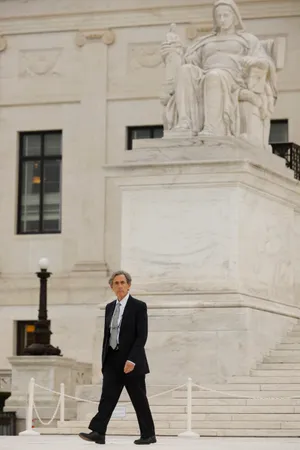GOP setback in DEI battle: Judge refuses to block grant program for Black women
A federal judge ruled Tuesday that an Atlanta venture capital firm can continue handing out grants to Black women entrepreneurs, saying a lawsuit claiming the program unlawfully excludes other races was unlikely to prevail.
The ruling dealt a setback to the American Alliance for Equal Rights, a nonprofit founded by anti-affirmative action activist Edward Blum.
“We won round 1 in the fight against the anti-affirmative action activists,” the Rev. Al Sharpton posted on X, formerly Twitter.
Blum's group filed an appeal seven minutes after the judge's ruling, according to the court filing.
"The district court denied a preliminary injunction. Its oral denial rested on one ground: that Fearless’ contest is speech protected by the First Amendment," the American Alliance for Equal Rights said in the appeal. "That reasoning flies in the face of decades of precedent."

A small player in the venture capital industry, the Fearless Fund was founded by Black women to back Black women who received less than 1% of the $215 billion in venture capital funding last year. The firm has funded new companies like restaurant chain Slutty Vegan and beauty brand Live Tinted.
U.S. District Court Judge Thomas Thrash Jr., who was appointed by President Bill Clinton, said the Fearless Fund’s $20,000 grant program is a form of protected speech under the First Amendment.
Two dozen Fearless Fund supporters attended Tuesday’s hearing, including Sharpton and former Atlanta Mayor Kasim Reed, The Atlanta Journal-Constitution reported. After the hearing denying a preliminary injunction, they cheered Fearless Fund founders Arian Simone and Ayana Parsons and Sharpton held a rally at the courthouse.

"The reality is that Black women and women of color are significantly under resourced in advancing their business endeavors," Alphonso David, of counsel to the Fearless Fund and president and CEO of the Global Black Economic Forum, said in a statement. "There is no law that restricts grants from being issued to women of color or Black women, particularly in light of this disparity. We are pleased with this result."
The lawsuit against the Fearless Fund alleging “explicit racial exclusion” filed in August has become a cause celebre as the affirmative action wars shift to the workplace.
The Fearless Fund case is part of a growing pushback from conservative activists like Blum, who fresh off the landmark affirmative action victory over race-conscious college admissions, has set his sights on the private sector.
He has taken aim at efforts to close the racial gap in corporate America.

Though it does not apply to employers, conservative activists seized on the decision that struck down affirmative action in higher education, arguing it raises fundamental issues about how corporate America addresses workplace inequality. Since then, the nation has seen an uptick in legal challenges to DEI programs, and Republican state attorneys general have warned large employers like Microsoft and Walmart against race-conscious practices in hiring and contracting.
Corporations wrestling with the implications of that ruling are urging the Biden administration to weigh in.
Corporate diversity, equity and inclusion initiatives – DEI for short – were already under fire from GOP leaders like Florida Gov. and presidential hopeful Ron DeSantis. Republican criticism only intensified in the wake of the Supreme Court ruling in June.
Disclaimer: The copyright of this article belongs to the original author. Reposting this article is solely for the purpose of information dissemination and does not constitute any investment advice. If there is any infringement, please contact us immediately. We will make corrections or deletions as necessary. Thank you.







